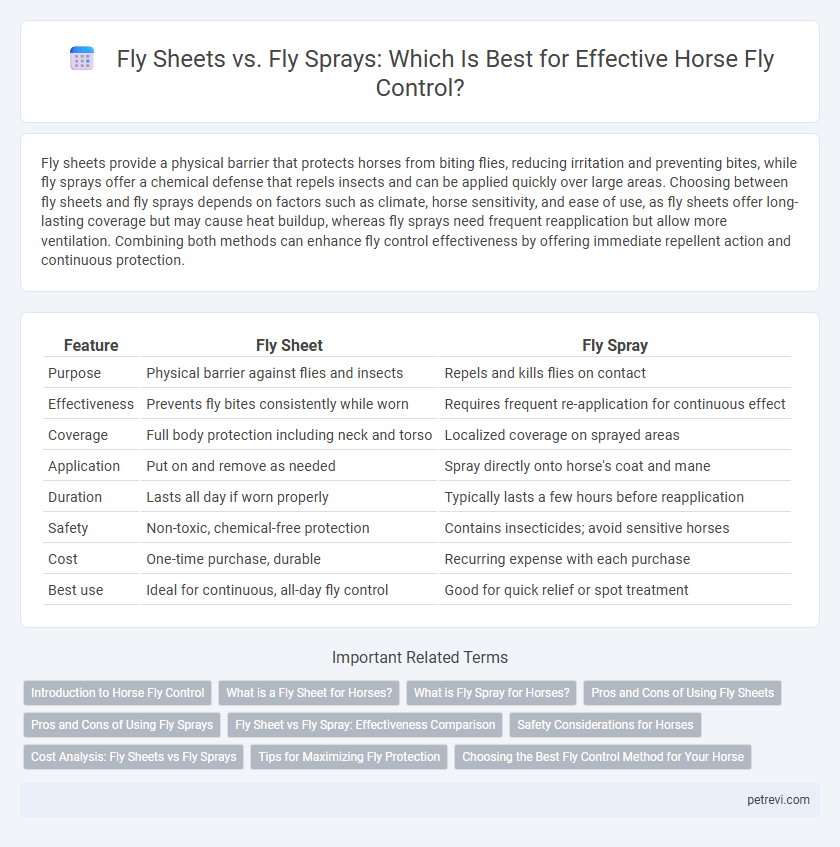Fly sheets provide a physical barrier that protects horses from biting flies, reducing irritation and preventing bites, while fly sprays offer a chemical defense that repels insects and can be applied quickly over large areas. Choosing between fly sheets and fly sprays depends on factors such as climate, horse sensitivity, and ease of use, as fly sheets offer long-lasting coverage but may cause heat buildup, whereas fly sprays need frequent reapplication but allow more ventilation. Combining both methods can enhance fly control effectiveness by offering immediate repellent action and continuous protection.
Table of Comparison
| Feature | Fly Sheet | Fly Spray |
|---|---|---|
| Purpose | Physical barrier against flies and insects | Repels and kills flies on contact |
| Effectiveness | Prevents fly bites consistently while worn | Requires frequent re-application for continuous effect |
| Coverage | Full body protection including neck and torso | Localized coverage on sprayed areas |
| Application | Put on and remove as needed | Spray directly onto horse's coat and mane |
| Duration | Lasts all day if worn properly | Typically lasts a few hours before reapplication |
| Safety | Non-toxic, chemical-free protection | Contains insecticides; avoid sensitive horses |
| Cost | One-time purchase, durable | Recurring expense with each purchase |
| Best use | Ideal for continuous, all-day fly control | Good for quick relief or spot treatment |
Introduction to Horse Fly Control
Effective horse fly control is essential for maintaining equine health and comfort during fly season. Fly sheets provide a physical barrier that protects horses from biting flies by covering the body, while fly sprays offer a chemical deterrent that repels insects on direct contact. Combining both methods enhances protection by minimizing fly irritation and reducing the risk of fly-borne diseases.
What is a Fly Sheet for Horses?
A fly sheet for horses is a lightweight, breathable mesh covering designed to protect horses from biting flies and other insects. It reduces irritation and the risk of infections caused by insect bites, providing a physical barrier without the use of chemicals. Fly sheets are ideal for horses with sensitive skin or those prone to allergic reactions, offering continuous protection during outdoor exposure.
What is Fly Spray for Horses?
Fly spray for horses is a topical insect repellent formulated to deter flies, mosquitoes, and other biting insects that cause discomfort and potential health issues. It typically contains ingredients such as pyrethroids, essential oils, or other insecticidal compounds that provide immediate protection by repelling and killing flying pests upon contact. Fly spray offers flexible application and quick relief, making it an effective option for horses exposed to high fly populations in various weather conditions.
Pros and Cons of Using Fly Sheets
Fly sheets provide continuous physical protection against horse flies, effectively reducing biting and irritation without the need for repeated applications. They offer a chemical-free option that minimizes the risk of allergic reactions and environmental impact but can cause heat buildup and restrict airflow, potentially leading to discomfort in hot weather. Proper fit and material quality are essential to prevent rubbing and ensure the horse's freedom of movement while maximizing fly deterrence.
Pros and Cons of Using Fly Sprays
Fly sprays for horse fly control offer quick and targeted protection through insecticidal chemicals, making them effective in reducing fly irritation and potential disease transmission. However, frequent application is necessary due to limited residual effect, and some formulations may cause skin sensitivity or respiratory issues in horses. Unlike fly sheets, sprays provide no physical barrier, requiring careful reapplication during heavy fly activity for optimal effectiveness.
Fly Sheet vs Fly Spray: Effectiveness Comparison
Fly sheets provide a physical barrier that effectively prevents horse flies from reaching the horse's skin, offering long-lasting protection without the need for repeated application. Fly sprays deliver immediate repellency by masking the horse's scent and deterring flies, but their effectiveness diminishes with sweat or rain and requires frequent reapplication. Combining both methods can enhance overall fly control, balancing durable coverage with targeted insect deterrence.
Safety Considerations for Horses
Fly sheets provide a physical barrier that prevents horse flies from biting, reducing the risk of allergic reactions and skin irritations without exposing horses to chemical agents. Fly sprays often contain insecticides that can cause skin sensitivities, respiratory issues, or toxicity if improperly applied or ingested. Prioritizing non-toxic, horse-safe formulations and ensuring fly sheets fit correctly are crucial for effective and safe fly control measures.
Cost Analysis: Fly Sheets vs Fly Sprays
Fly sheets for horse fly control typically require a higher upfront investment, averaging $50 to $150 per sheet, but offer long-term protection and durability. Fly sprays are more affordable initially, costing around $10 to $30 per bottle, but need frequent reapplication which can increase expenses over time. Evaluating ongoing costs, fly sheets may prove more economical despite the initial price due to their reusable nature and consistent coverage.
Tips for Maximizing Fly Protection
Fly sheets provide physical barriers that effectively block horse flies, while fly sprays offer chemical deterrents that can reach hard-to-cover areas. To maximize fly protection, combine fly sheets with regular application of sprays, especially during peak fly activity times, and ensure proper fit of the sheet to prevent gaps. Applying sprays to legs and under the belly, areas often exposed by the sheet, enhances overall defense against flies.
Choosing the Best Fly Control Method for Your Horse
Fly sheets provide a physical barrier that prevents flies from landing on your horse, offering long-lasting protection without the need for frequent reapplication, making them ideal for horses with sensitive skin or allergies. Fly sprays contain insecticides that repel or kill flies on contact but require regular application, especially after sweating or rain, and may cause irritation in some horses. Selecting the best fly control method depends on your horse's sensitivity, the severity of the fly problem, and convenience preferences, often combining both for optimal protection.
Fly Sheet vs Fly Spray for Horse Fly Control Infographic

 petrevi.com
petrevi.com